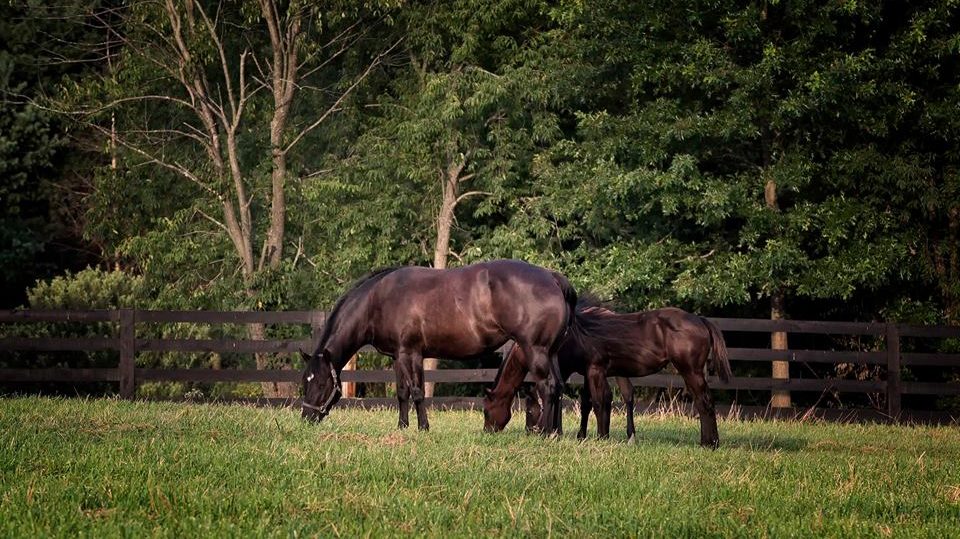Breeding season is one of the most exciting times of the year for horse owners. Countless hours are spent pairing the perfect genetics in hopes of producing a foal that is capable of being a champion.
In the past, when breeders were faced with problems, their options were limited. Fortunately, there could now be a solution for these hard to breed and even deceased horses. Intracytoplasmic Sperm Injections (ICSI) is a relatively new procedure that offers a lot of promise.
GoHorseShow spoke with Dr. Kartin Hinrichs who is a veterinarian and professor at Texas A&M University. Dr. Hinrichs is known internationally for her work in equine reproduction. Her laboratory produced the first cloned horse in North America and also successfully developed techniques to improve the clinical application of ICSI.
We also spoke with Debbi Trubee of North Farms, Inc. in Ohio. Debbi has a lifetime of experience in the Quarter Horse industry. She is a breeding manager who stands several leading pleasure stallions. Debbi shared her experience with ICSI and how it has been beneficial in her breeding program.
The Procedure – The first step of the ICSI procedure is trans-vaginal follicle aspiration (TVA). During this process, the mare is put under sedation and oocytes (eggs) are recovered through aspiration from the ovarian follicles. Once oocytes are removed, they are cultured in a lab until matured. This process mimics the changes that would occur naturally in the oocyte before ovulation. This usually takes 12 to 30 hours. When matured, the cytoplasm of the oocytes is injected with a single sperm from the stallion of choice under a microscope. The fertilized oocytes will stay in the lab for the next 7 to 10 days while they develop into blastocysts (embryos). Once blastocysts are developed, they can be transferred into a recipient mare or vitrified (frozen) for later use.
Dr. Hinrichs mentioned, it is essential for owners to be aware that TVA is invasive and carries some risks to mares. While uncommon, ovarian abscesses, peritonitis and infection are possible but <0.05%.
Conception – It has been found that this procedure is often successful, but it is not a guarantee for a foal. Several factors affect the success of ICSI. Dr. Hinrichs explains, “The chance of getting a transferrable embryo after ICSI depends on the intrinsic fertility of the mare, the follicles from which the oocytes were recovered, the intrinsic fertility of the stallion and the method of semen preservation, as well as the expertise of the ICSI facility. For this reason, while the average clinical embryo production in a facility might be one transferrable embryo per TVA, some TVAs will result in no embryos produced, while other TVAs might result in multiple embryos produced.”
Debbi shared that it’s exciting to hear a vet say they have harvested ten oocytes from a great mare. Unfortunately, it is possible for all of the oocytes to fail to mature or not reach the point of even being transferred to a recipient mare. Debbi warns “It is a hit and miss procedure and while I know many who had multiple embryos, there are also many who spent a pile of money to get nothing for their effort.”
Candidates – Debbi shared in her experience, ICSI has been an excellent program that has given extended life to mares and stallions that are no longer viable for reproduction. She explained, “As a stallion manager, I have assisted many customers over the years in using ICSI for their mares that could no longer produce a viable embryo or were going to be euthanized and they wanted one more baby from them. Harvesting the ovaries and using the ICSI procedure has given those owners one more baby from their cherished mare. ICSI has also extended the life of many stallions that are either deceased or subfertile utilizing frozen semen.”
Dr. Hinrichs explained that because straws of semen can be thawed, diluted and refroze for ICSI, one straw of semen has the potential to produce thousands of foals. This dramatically increases the number of breedings that owners and breeding managers can offer each year.
Foals – Dr. Hinrichs did a study with Texas A&M University on foals and placentas from usually conceived embryo transfer and ICSI embryo transfer foals. The study found no differences in size, weight or expression of the genes that were evaluated. While there have been some reports of ICSI conceived foals having health problems, Dr. Hinrichs stated that ICSI foals do not seem to have any more health issues than normally conceived foals.
Costs – Because of the labor and expenses associated with ICSI, those considering this procedure should decide if the foal’s value is worth the price. Typically along with purchasing semen, mare owners will also be responsible for the fees of TVA, the ICSI procedure and transferring the embryo to the recipient mare. Debbi advises “ICSI is not the first choice if you’re trying to raise babies for profit. It is, however, a godsend for those great producers to continue to contribute to the gene pool.”
ICSI offers a lot of hope for breeders. Though it is expensive, it could be the answer breeders have been looking for. As with any equine medical procedure, time should be spent talking with a veterinarian to decide if this procedure would be the right fit for your breeding program.
About the Author: Ashley Freeman Shook graduated with a Master’s degree in Animal Science in 2015. She has been showing horses since she was a little girl. Today, she focuses on riding and showing cutting horses. She also raises cattle and two little cowboys with her husband in Oklahoma.









